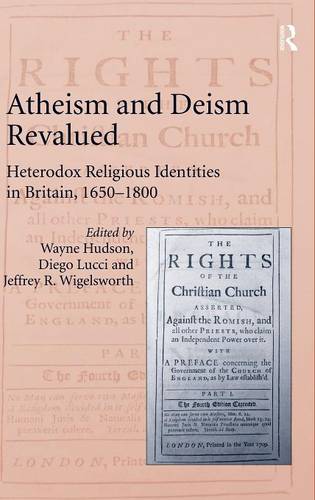Atheism and Deism Revalued: Heterodox Religious Identities in Britain, 1650-1800
Lucci, Diego, Hudson, Wayne
£95.00 £114.11
1 available
Book Details:
Publisher:Routledge
ISBN:9781409456803
Published Date:28th November 2014
Dimensions:162 X 236 X 25 mm
Weight:0.6806 kilograms
Pages:292
Binding:Hardcover
Condition:New
Notes:New mint HB Ashgate 2014
Short Description
In the seventeenth and eighteenth century the terms 'atheism' and 'deism' involved fine distinctions that have not always been preserved by later scholars. The original deployment and usage of these terms were often more complicated than much of the historical scholarship suggests. Offering new perspectives on a range of prominent figures.
Full Description
Given the central role played by religion in early-modern Britain, it is perhaps surprising that historians have not always paid close attention to the shifting and nuanced subtleties of terms used in religious controversies. In this collection particular attention is focussed upon two of the most contentious of these terms: 'atheism' and 'deism', terms that have shaped significant parts of the scholarship on the Enlightenment. This volume argues that in the seventeenth and eighteenth century atheism and deism involved fine distinctions that have not always been preserved by later scholars. The original deployment and usage of these terms were often more complicated than much of the historical scholarship suggests. Indeed, in much of the literature static definitions are often taken for granted, resulting in depictions of the past constructed upon anachronistic assumptions. Offering reassessments of the historical figures most associated with 'atheism' and 'deism' in early modern Britain, this collection opens the subject up for debate and shows how the new historiography of deism changes our understanding of heterodox religious identities in Britain from 1650 to 1800. It problematises the older view that individuals were atheist or deists in a straightforward sense and instead explores the plurality and flexibility of religious identities during this period. Drawing on the most recent scholarship, the volume enriches the debate about heterodoxy, offering new perspectives on a range of prominent figures and providing an overview of major changes in the field.


